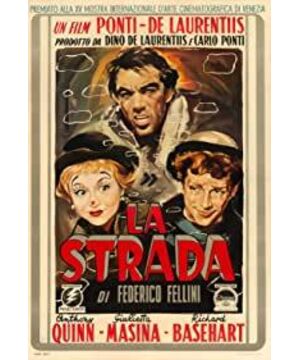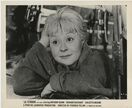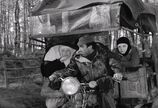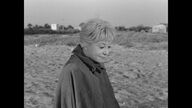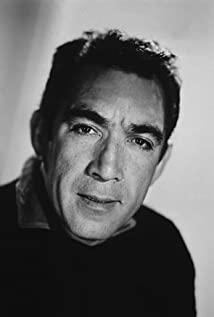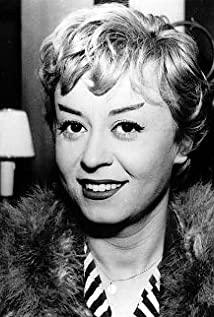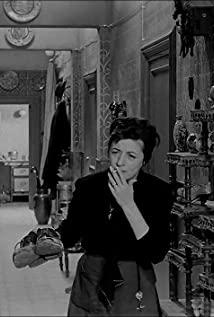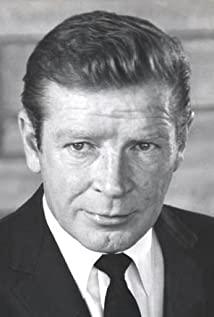Jesomina and
Zambano are pure and ignorant. Jesomina is sold cheaply by her mother to the wandering artist Zambano as an apprentice. During the show, Zambano raped Jesomina, and Jesomina thought it meant the beginning of love. But every indulgence by Zambano and other women made Jesomena miserable. Zambano fights with the fool and is put in jail, but Jessomena chooses to stay at Zambano and return. When they both went on the road again and met the fool again, Zambano missed the fool and killed him. Later, Zambano abandoned Jesomina, who was frightened and insane. A few years later, Zamba Nobano heard someone humming Jesomina's tune. The singing woman told him that a girl wandered here and died lonely and desolately.
Fools and angels
Fools are entertainers walking tightrope with white wings on their backs, like angels falling from the sky. He is a natural enemy of the demonic Zambano, and he is full of compassion and affection for Jessomina. The fool, like all kind admirers, always sees the love of others very clearly. He told Jessomena that every pebble is useful and everyone has a meaning in life. He also foresaw his death, saying that he would not live long. The fool made Jesomina’s vague emotions firm, "If I leave him, who else wants to be with him." More importantly, the fool told Jesomina that Zambano is a barking dog. He would only use rudeness to cover up unexpressed emotions. In fact, Zambano loves her in his heart. In this way, the fool built a tower of faith in love for Jesomina, and his sudden death symbolized the collapse of all Jesomina’s beliefs. Jessomina, who had witnessed the destruction of Zambano's body, was frightened and would only whisper "The fool is injured" ever since. In order to prevent the murder from being revealed, Zambano abandoned her.
Juliet Tower and Fellini
Juliet Tamasina played Jessomina, who was also the wife of Fellini who accompanied Fellini all his life. Fellini once said that Jesomina's innocence is the green look of Julieta, ten-year-old with a pursed smile. Like Gesomina and Zambano, Julieta and Fellini are inseparable combinations in work and life. It's just that despite Fellini's care, every scandal with other actresses still tortures Juliet's body and mind. Light and shadow advance in parallel with reality, and Jesomena and Juliet become the opposite of each other. Juliet Tower successfully shaped the screen image of Jessomena, and Jessomena's perseverance and perseverance have also become Juliet Tower's support, always guarding Fellini's side. Fellini said when he received the Oscar for Lifetime Award, "I can't count everyone's name over and over, I just want to say one name, an actress, who is also my wife, thank you, dear Julieta... Please don't cry anymore." At this moment Juliet Tower burst into tears in the audience.
Tragedy and comedy
. In the movie, Zambano will never have a chance to say "Please don't cry anymore." The advantage of the ending of "The Road" is that it did not follow the lonely figure of Zambano, but only recorded Zamba. Nuo was crying in the face of the unconfessed loneliness. At this time, if Zambano had a bun on his head and a bronze mirror on his chest, he would be the supreme treasure who was going to recite the handed down lines in front of Guanyin. Some people also say that this is the end of a comedy, because Jesomina's divinity saved Zambano's crude and fallen soul, so that he finally cried out his guilt from the darkest part of his heart. This reminds me of the famous small three movie "Floating Clouds", the work of Mikio Naruse, which tells the story of Sachiko who followed the life of a married man, Tomioka, who was left behind, and eventually fell ill and died next to Tomioka. Maybe you can die in the arms of your lover, in the heart of your lover, and death is no longer the end of sorrow but a happy ending.
-----------------------------------Self-closing and inward dividing line-------- -----------------------------------
Though
you do not get what you
want in your life?
I got what
you want?
Call yourself a lover, and feel
Loved by this world.
——Carver "Late Thoughts"
View more about La Strada reviews


